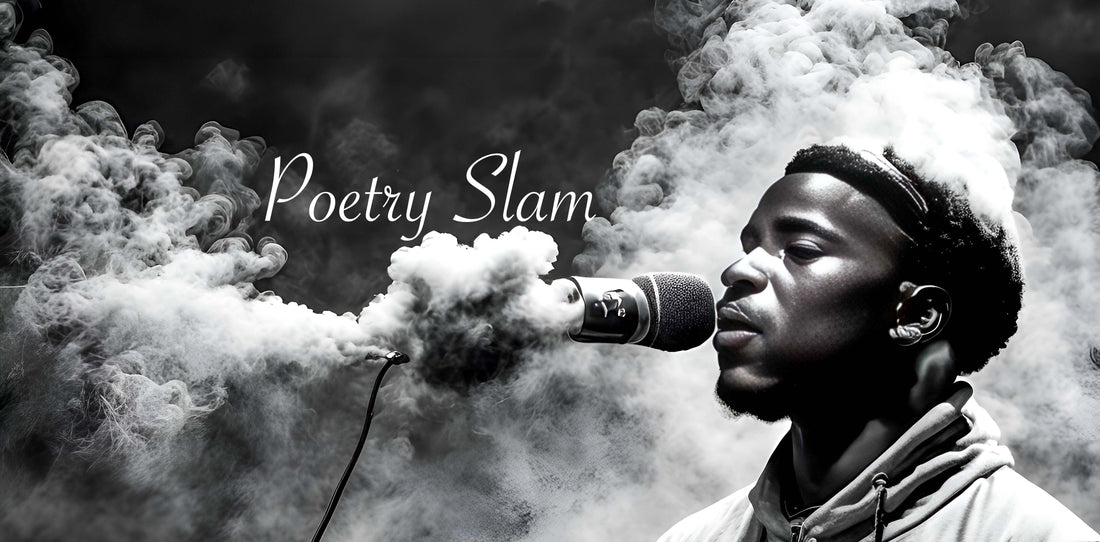
On Slam Poetry: An Introduction to Spoken Word & Buddy Wakefield
Share
I’m often surprised by who and what people are—and aren’t—familiar with. And I don’t mean that through the lens of arrogance or elitism. What we know and don’t know is mostly chance: whether our experiences happened to intersect with a particular idea, person, or piece of art. Not knowing something is arbitrary and not characteristic or deserving of criticism or shame.
Sometimes, in conversation, I’ll ask if someone’s familiar with the world of slam poetry. It’s not my favorite question—I’m not interrupting strangers in bars asking who their favorite poet is. It’s contextual. But while many respond with curiosity, others react as though I’ve insulted them. “Of course, pfft,” they say, bleeding out of their ears with indignation. I don’t understand why people feel like they’re supposed to know everything. And if they don’t, they’d rather pretend than merely say, “Hmm, no—sounds interesting. Tell me more.”
Buddy Wakefield is a slam poet with a unique way of reflecting on our unconscious thoughts and behaviors. He presents the human condition in a way that’s expansive and emotionally precise. Listening to his poetry throughout my life has signified different things at different times. It’s allowed me to explore the human experience in the space between the black and white of our ingrained reactions.
Wakefield was born in Shreveport, Louisiana, and raised in Baytown, Texas. Just shy of thirty, after working as an executive assistant at a biomedical firm in Washington state, he sold everything he owned, moved into his Honda Civic, and started touring poetry venues across the country. That’s something I can, kind of, relate to.
Slam poetry, for those unfamiliar, is a form of spoken word that blends performance, writing, competition, and audience participation. Events called “poetry slams” are built around the power of the audience to praise or destroy a poem in real time. Wakefield won the Individual World Poetry Slam Championship in both 2004 and 2005.
I’ve never attended an official slam, but I’ve attended open mics dedicated to spoken word.
“The Information Man” was my introduction to Wakefield. I can’t recall when I first heard it or how it found me. But I memorized it. I’ve recited it at open mics in different cities. It’s a poem about the complexities of human connection and the search for meaning in a digital age.
“Convenience Stores” paints a portrait of everyday American struggle—mental health not in its clinical forms, but in its quiet, foundational presence. The kind that shapes our days without naming itself.
I’m not as familiar with other spoken word artists as I am with Wakefield, but I’ve appreciated the work of Sarah Kay, George the Poet, Emi Mahmoud, and Blythe Baird. For every one poet, there are a thousand more waiting in the wings—people who got tired of maneuvering the bureaucracy of expression, so they stood still and started talking. Eventually, someone handed them a microphone.
I like this world because it’s expressive and introspective at once. While researching for this post, I came across Shane Koyczan’s “To This Day.” I’m sitting here listening to it, and it’s amazing how familiar it sounds. If you’ve read my writing and watched the poem, you might recognize what I mean. This is why I appreciate spoken words. It’s desperately relatable. Poetry is universal, but people shy away from it because they only know the classics or the quotes that circulate online. We don’t explore ideas as much anymore. We reinforce someone else’s ideas that we’ve already accepted.
That’s why I’m writing this post. There are many ways we’re similar, and yet we disconnect. At the moment an idea is presented, the way we experience an event, the misunderstanding of an intention, the shadow of that weight we carry. We’ve all got to get back to our art. Slam poetry and spoken words can be a way to reroute us—if we let it. Find a few minutes. Listen to these poems. Let me know what you think. Comment with your poem.
In the long run, it’s not about being familiar with everything. It’s about being open to discovering new ideas and perspectives. Buddy Wakefield’s poetry—and the world of slam poetry—have taught me that. It’s about embracing our shared human experiences and finding connection in the unlikeliest places. So, embrace the unknown. Listen to each other’s stories. Let’s find our way back to the art that makes us feel alive. And, in the comments below, share your thoughts. Share your poems. Let’s keep the conversation going.